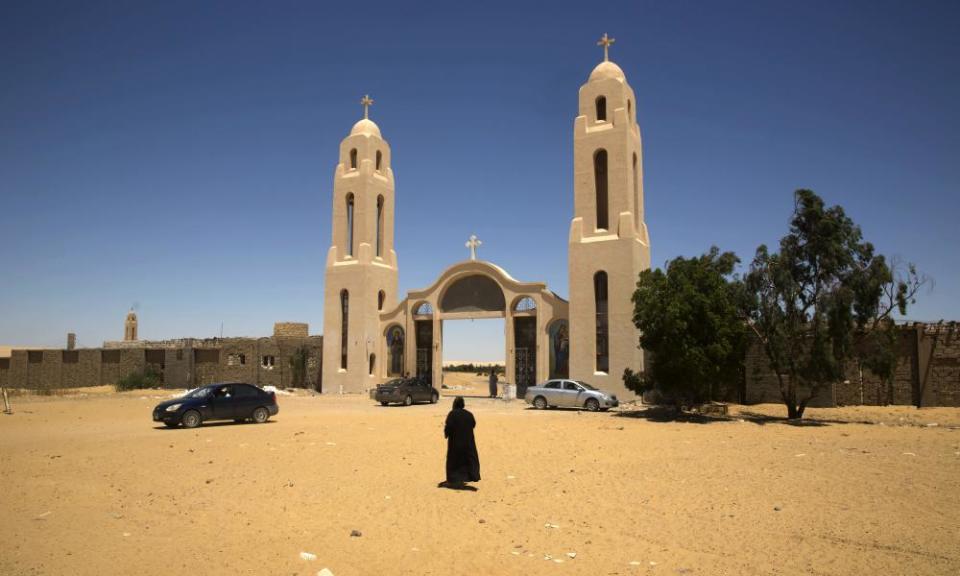Coptic Christians accuse Egyptian government of failing to protect them

Egypt’s Coptic Christians have accused the government of failing to protect them in the wake of an attack claimed by Islamic State on a bus convoy that killed at least 29 people and injured about 20 more.
Relatives of some of those killed said the attack, which occurred after a group of gunmen stopped a convoy headed for the Saint Samuel monastery close to the southern Egyptian town of Minya, undermines the state of emergency in Egypt declared after a previous attack in April.
Videos of the attack began to surfaced on social media networks on Sunday, two days after 29 were killed in the attack on a desert road south of the capital. Isis claimed responsibility for the attack on Friday. It was the fourth attack against Christians in Egypt since December to be claimed by the IS. The string of attacks have killed more than 100 and injured scores.
One survivor, a small boy who seemed to be about six, said his mother pushed him under her seat and covered him with a bag. A young woman speaking from her hospital bed said the assailants ordered the women to surrender their jewelry and money before they opened fire, killing the men first and then some of the women. The woman said the gunmen were masked and wore military uniforms.
Kirollos Mahrous, 19, and his 25-year-old cousin Guirguis Mahrous were two of those killed in Friday’s attack, as they travelled to the monastery for work.
Guirguis, his friend Mina Adel said, was due to be married in the coming weeks. Adel later provided pictures showing a smiling and suited Guirguis next to his fiancee, and then one of injuries that killed him – with a large bullet hole under his left ear.
“He tried to join the police force after he finished high school,” said Adel, “but he was turned down, because he’s Christian.”
“The state of emergency isn’t making anything better, it’s as if it’s not there,” said Eid Fares Ishak, another cousin of Guirguis and Kirollos. “The government is supposed to take more precautions and be more firm in case of such attacks, like doing an immediate search following the attack and not waiting for hours like they did.”
Egypt’s government previously vowed to boost security and protect its Christian citizens after suicide bombings struck two churches on Palm Sunday, leaving at least 45 dead. But many of Egypt’s Christians, who at roughly 10% of the population represent the country’s largest religious minority, say that the nationwide state of emergency imposed on 10 April has done little to protect them.
Friday’s attack in Minya was the fourth of its kind since December, when a suicide bomber targeted St Mark’s Coptic Cathedral in Cairo, leaving at least 29 dead. In February, when claiming responsibility for the December attack, Isis named Christians in Egypt as “our first target and favourite prey”.
Pope Francis led a prayer on Sunday for the victims of the Minya attack, saying that they were killed in “another act of ferocious violence” after having refused to renounce their Christian faith. The pope recently met Egyptian president Abdel Fatah al-Sisi during a trip to Egypt intended to promote interfaith dialogue.
“It’s all talk and no action,” said Adel, criticising the Egyptian government’s response to the growing number of attacks on Christians. “Even this state of emergency: they announced it to calm public opinion, but it’s not really helping. Even the priests, bishops and parliament members don’t have the same respect from people any more – now no one takes their ‘soothing’ words seriously. We’re fed up. Plus, the government isn’t doing anything extra, in fact it’s worse than it used to be in terms of how the police treat people.”
Coptic Christians in Egypt have long pointed to institutional prejudices against them because of their religion, notably in the courts, which they say fail to prosecute those who commit acts of violence against Christians. Eshhad, a project by the Cairo-based Tahrir Institute for Middle East Policy which tracks persecution of Egypt’s Copts, found 36 examples of persecution in 2017 alone, including beheadings, targeted violence and the Minya bus attack.
In response to Friday’s attacks, Egypt’s government conducted six airstrikes on jihadi training camps in the Libyan town of Derna. Isis later claimed responsibility for the Minya bus attack, while the Mujahideen Shura Council, an al-Qaida affiliate that controls the area of Derna targeted by Egypt, released a statement saying it was not responsible for Friday’s attack, as it was not its policy to target civilians.

 Yahoo News
Yahoo News 